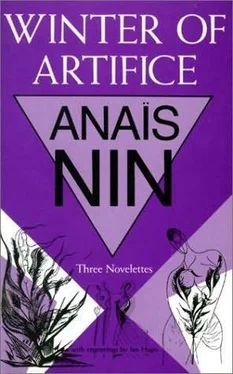Anaïs Nin - The Winter of Artifice
Здесь есть возможность читать онлайн «Anaïs Nin - The Winter of Artifice» весь текст электронной книги совершенно бесплатно (целиком полную версию без сокращений). В некоторых случаях можно слушать аудио, скачать через торрент в формате fb2 и присутствует краткое содержание. Год выпуска: 2007, Издательство: Sky Blue Press, Жанр: Классическая проза, на английском языке. Описание произведения, (предисловие) а так же отзывы посетителей доступны на портале библиотеки ЛибКат.
- Название:The Winter of Artifice
- Автор:
- Издательство:Sky Blue Press
- Жанр:
- Год:2007
- ISBN:нет данных
- Рейтинг книги:4 / 5. Голосов: 1
-
Избранное:Добавить в избранное
- Отзывы:
-
Ваша оценка:
- 80
- 1
- 2
- 3
- 4
- 5
The Winter of Artifice: краткое содержание, описание и аннотация
Предлагаем к чтению аннотацию, описание, краткое содержание или предисловие (зависит от того, что написал сам автор книги «The Winter of Artifice»). Если вы не нашли необходимую информацию о книге — напишите в комментариях, мы постараемся отыскать её.
“A handful of perfectly fold fables, and prose which is so daringly elaborate, so accurately timed… using words as magnificently colorful, evocative and imagist as any plastic combination on canvas but as mysteriously idiosyncratic as any abstract.”
—
The Winter of Artifice — читать онлайн бесплатно полную книгу (весь текст) целиком
Ниже представлен текст книги, разбитый по страницам. Система сохранения места последней прочитанной страницы, позволяет с удобством читать онлайн бесплатно книгу «The Winter of Artifice», без необходимости каждый раз заново искать на чём Вы остановились. Поставьте закладку, и сможете в любой момент перейти на страницу, на которой закончили чтение.
Интервал:
Закладка:
A volume of Proust was open on the desk. It was marked with Johanna’s name, with references to Johanna’s lies, Johanna’s friends. The last page on the typewriter was a description of Johanna’s jealousies, the scenes she created, the brusque reconciliations. Johanna. Johanna.
I picked a book out of his bookcase. Johanna’s name in the margin. I looked at the maps on the walls, the large maps Hans made of his future novels. “Life with Johanna on Sullivan Street.” A list of incidents, of the friends who surrounded them, of the quarrels and the despairs and the separations.
My joy crumbled. He loves no one but her.
But Hans came in then, and without looking at his desk, or at the photograph, or at the open book, he turned wholly to me, with all his ideas, his plans, his love.
“Roll up your sleeves,” he said, “there’s work to do. This description of Johanna is giving me trouble. Read it. Tell me how it strikes you.”
If only Johanna would die. If she would die. She does not love him as I do.
“The worst of lies,” I said to Hans, “is that they create solitude. I know Johanna must have been lonely at times. When you treat life and men like a play, and you can never speak or be what you really are, you get lonely.”
“You speak feelingly about it. I have no doubt you’re experienced in that pretending too. Now tell me, why do you think Johanna so often repeated that I would never know the greatest secret of her life, even when I was absolutely sure of her love for the other woman?”
“There was another secret…”
“You believe all that about the drugs?”
If she would only die! But then she would only live more vividly as a legend…
“I enjoy Johanna best when she is not here,” said Hans, “for then I can peacefully write and think about her. When she is here I feel choked and crushed. With you I shall call it the Golden Age between Wars. It is in time of peace that art is born.”
Slipping his hands through my hair, gently, he began to talk about Johanna. I knew that he was noting things in his mind, noting and thinking of his work. I knew too that it had fallen to my destiny to nourish the creator and love him in order to give him the strength to write about her, and that it might befall another woman to nourish Hans while he would be writing about me. In a flash I saw it all in a strange cycle of life and creation, life sustaining the creation, which was always concerned with the more distant experience, with the past.
“How is one to recognize a lie?” said Hans.
“By its dissonant tone. It is like a false note.”
“You have too musical an ear.”
“I have studied my own lies, I have trained my ear. For example, I am sure that both Johanna and I invent personages… I have often thought to myself: ‘I must keep silent.’ I must let this man look at my face and allow his dream of me to take form. I must give his imagination time to invent. While he is looking at me, if I say nothing, he is forced to interpret me by the color of my skin, the wave of my hair, the color of my dress, the shape of my neck, the few rare gestures I make. I feel him building an image. I see the image take form in his eyes. It lies in his eyes like a reflection in a river. I don’t want to open my mouth and speak. If I say what I want to say he may think I am just an ordinary woman. The image of me which he has been weaving like a spider web and which is trembling on the edge of his eyes like reflections of houses in a river may suddenly sink. I may see his eyes waver for a second and then turn into the glassy brilliance of reality and disillusion. Or even if I should smile—my smile may not conform to that intensely desired image he has been carrying about. I would like to answer people’s impossible wishes. I have tired myself desiring impossible things. I have so often sat and watched a beautiful face, beautiful while impassive, because its stone-like stillness allowed my fancy to create its meaning. And I have seen so often the disintegration of my fancy at the mere appearance of a smile. I have so often sat behind a face dreaming and desiring ardently that this face should answer my craving. I have experienced so often the demolition of a whole universe by a few words. I have been so fearful of those words, of hearing the voice, of seeing the face move, so fearful that my image, my dream, should be swept away. If the man spoke first and said: ‘You seem to me like a Hindu woman, so childlike and secretive,’ I can be that also. I can be all things. Whatever you want can become a game for me. I can play the role of the child-like secretive Hindu woman. If the man says: ‘You seem perverse to me,’ then I gather together all my knowledge of perversion, all I have read or seen on the stage and I play it all with such earnestness that finally I come to believe it myself.”
“You and Johanna…”
“I am sure that we have both played like this. It makes life difficult. People feel a certain falseness and then they seek to discover the reality, our reality. This reality we evade with al our cunning. And all this contributed to Johanna’s tenseness and her fear of being discovered. We want to be loved without being known. We are like porcupines with silver spikes. We imagine that our true selves cannot bear the light of common every-day simplicity. I am sure that as soon as she felt that the other’s image of her was in danger through something she said or did, she rushed to destroy the effect, to deny it, saying it was a jest or a game, mystifying and eluding any final judgment.”
“False mysteries.”
“Look at the pounds of notes her false mysteries have inspired. Let me read your last pages.”
When I had read them I said: “You’re the only man I would scrub floors for!”
“We could be very happy together. You would fall behind in your writing!”
“Good! I fall behind in my writing. I become the wife of a genius.”
“To-day, if there were a choice to be made between you and Johanna, I would surrender Johanna.”
“No, no,” I laughed. “No.”
“Johanna can be replaced, but I could have a thousand women after you and they could not efface you or replace you…”
“You’re drunk, Hans. I’m sure you’re drunk.”
I feared that he might say: “We will continue to find a rich interest in each other even if Johanna returns and I resume my life with her.” At the thought of this I felt the need of touching his suit, his arm, to exorcise my fear. Then I observed the mischievous twist of his mouth and I installed myself in the present, in my enjoyment of the hour.
We were sitting in the garden.
“Something happened to me yesterday,” said Hans musingly. “I happened to read over Johanna’s few letters and they moved me. I was about to send her a cable. Instead I wrote about her. And when I awoke this morning it was all over.” He handed me the last pages. “What do you think of them?”
They were among his best, I felt, after reading them carefully. Fevered and yet cohesive, strongly knitted. Spear blows. I thought how the beauty of these pages made it possible for me to subordinate my natural jealousy and possessiveness to my passionate devotion to the writer, the creator who required full latitude. I felt a separate, an immense, proud servitude to the splendor of his writing. I wanted my love to be an aliment. I wanted to augment his well-being, to feed him, to watch over him. He sat with a new compactness, a new strength in him, a new wholeness.
I imagined many books being born out of our intimacy. And I melted <���…>
There were other people there, there had often been other people around us, with us, but I had only noticed and heard Hans. I was only attuned to Hans. I was conscious only of Hans. To-night I made an effort to become aware of the others, of Andre with fanatic blue eyes talking about astrology, of Louise with a voice like a wood-pecker, of Boris, who said the streets were worn by Hans’ wanderings.
Читать дальшеИнтервал:
Закладка:
Похожие книги на «The Winter of Artifice»
Представляем Вашему вниманию похожие книги на «The Winter of Artifice» списком для выбора. Мы отобрали схожую по названию и смыслу литературу в надежде предоставить читателям больше вариантов отыскать новые, интересные, ещё непрочитанные произведения.
Обсуждение, отзывы о книге «The Winter of Artifice» и просто собственные мнения читателей. Оставьте ваши комментарии, напишите, что Вы думаете о произведении, его смысле или главных героях. Укажите что конкретно понравилось, а что нет, и почему Вы так считаете.











